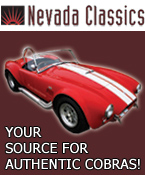 
 Main Menu
Main Menu
|
 Nevada Classics
Nevada Classics
|
 Advertise at CC
Advertise at CC
|
 February 2025
February 2025
|
| S |
M |
T |
W |
T |
F |
S |
| |
|
|
|
|
|
1 |
| 2 |
3 |
4 |
5 |
6 |
7 |
8 |
| 9 |
10 |
11 |
12 |
13 |
14 |
15 |
| 16 |
17 |
18 |
19 |
20 |
21 |
22 |
| 23 |
24 |
25 |
26 |
27 |
28 |
|
|
 CC Advertisers
CC Advertisers
|
|

05-30-2007, 11:03 AM
|
|
CC Member

|
|
|
Join Date: May 2007
Cobra Make, Engine:
Posts: 19
|
|

 Not Ranked
Not Ranked
 shelby 427 aluminum blocks
shelby 427 aluminum blocks
Anyone hear of people having problems with the Shelby aluminum blocks 'shifting' after warming up? I am new to this forum and am trying to confirm/deny this. I heard that due to the type of alloy that is being used, the block expands under temperature and changes the valve backlash adjustment. Because of this, they are recommending hydraulic lifters. Anyone know anything about this?
Thanks
|
-
Advertising


05-30-2007, 12:09 PM
|
|
CC Member

|
|
|
Join Date: Dec 2001
Location: Louisville,
KY
Cobra Make, Engine: I'm Cobra-less!
Posts: 9,417
|
|

 Not Ranked
Not Ranked
All aluminum blocks thermally expand. It's just the nature of the beast. Cold clearances are therefore set very tight.
You can use whatever cam/lifters you want.
|

05-30-2007, 06:02 PM
|
|
CC Member

|
|
|
Join Date: Apr 2007
Cobra Make, Engine:
Posts: 1,009
|
|

 Not Ranked
Not Ranked
 Aluminum Blocks
Aluminum Blocks
blykins is right, perfectly normal condition for Aluminum blocks and heads. My cold valve clearance is .008 n and .008 x when warmed up it is .020 n and
.020 x. The only issue I have had was that I needed a chain tensioner for the cam drive because it was so slack and noisy when cold. A good reason for a nice easy warm up with an aluminum engine.
A belt cam drive will solve this problem, but it is very difficult to package with a dry sump pump.
|

05-30-2007, 06:17 PM
|
 |
Senior Club Cobra Member

|
|
|
Join Date: Jan 2005
Location: saratoga,
ca
Cobra Make, Engine: Kirkham #185, Shelby Alloy 482; sold
Posts: 1,190
|
|

 Not Ranked
Not Ranked
Quote:
|
Originally Posted by Cobra #3170
blykins is right, perfectly normal condition for Aluminum blocks and heads. My cold valve clearance is .008 n and .008 x when warmed up it is .020 n and
.020 x. The only issue I have had was that I needed a chain tensioner for the cam drive because it was so slack and noisy when cold. A good reason for a nice easy warm up with an aluminum engine.
A belt cam drive will solve this problem, but it is very difficult to package with a dry sump pump.
|
That's odd. I have a Shelby aluminum block and heads with a flat tappet cam. My lifters are very noisy until the engine comes up to temperature, implying larger clearances when cold.
__________________
Dave
|

05-30-2007, 07:30 PM
|
|
CC Member

|
|
|
Join Date: Apr 2007
Cobra Make, Engine:
Posts: 1,009
|
|

 Not Ranked
Not Ranked
 Clearance
Clearance
I have had two different Aluminum FE's both with roller tappet cams, roller rockers and two different brands of aluminum heads. The first engine had a cold clearance of .006n and .008x and ended up at .020 when hot lashed, the second engine was .008 on both. Valve lash is a very critical dimension so I check it often and it holds these hot and cold dimensions. My cam is fairly radical
(292 D. @.050 and 287 D. @.050 with .780" lift), I don't think that would effect these clearances but perhaps it could, are you sure you are not hearing piston noise? I have heard of some engines that were close to 0 when cold with other cams but I have not personally seen such a condition.
|

05-30-2007, 08:13 PM
|
|
CC Member

|
|
|
Join Date: May 2007
Cobra Make, Engine:
Posts: 19
|
|

 Not Ranked
Not Ranked
 aluminum blocks
aluminum blocks
Thanks for your input. As a couple of you have pointed out, the laws of physics would imply that the tapets are loose when cold and tighten up (less clearance) when at operating temperature. I believe this is why some put in hydraulic lifters instead of using solid. They take up the cold 'slack'. Bad thing with hydraulics though, they will float long before solids! There is quite a valve 'slap' when cold with solids in an aluminum block. HP is being lost and wear is introduced over time.
I read that this is why HM (Holman Moody) prefers cast blocks. Their cast blocks (FORD Blueprinted) should be in production in the fall.
Last edited by PJ10; 05-30-2007 at 08:20 PM..
|

05-30-2007, 09:05 PM
|
|
CC Member

|
|
|
Join Date: Apr 2007
Cobra Make, Engine:
Posts: 1,009
|
|

 Not Ranked
Not Ranked
 Clearance
Clearance
It's the other way around, the block grows more than the push rods therefore valve lash increases with temperature IE the head moves away from the crank as the deck goes up from thermal expansion. The push rods are steel and their thermal rate of expansion is much lower so they stay about the same length and clearance between the rocker and push rod increases.
|

05-31-2007, 05:11 AM
|
|
CC Member

|
|
|
Join Date: May 2007
Cobra Make, Engine:
Posts: 34
|
|

 Not Ranked
Not Ranked
So if you want an alloy block, your best bet is to get a set of the new alloy SOHC heads and do away with pushrods.
You would want a chain tensioner (or belt drive).
Problems solved.
Aluminum pushrods? What diameter would be required to match the stiffness of steel? If no overall difference in weight due to increased diameters, why not?
|

05-31-2007, 06:01 AM
|
|
CC Member

|
|
|
Join Date: Dec 2001
Location: Louisville,
KY
Cobra Make, Engine: I'm Cobra-less!
Posts: 9,417
|
|

 Not Ranked
Not Ranked
I don't see the point in spending an extra $10k in cammer parts just so you can use an alloy block.
There are hundreds of aluminum FE blocks floating around right now (along with the myriad of SBF and SBC aluminum blocks). When you assemble the engine, you just have to make allowances for the expansion of aluminum.
Problems solved.
|

05-31-2007, 06:14 AM
|
|
CC Member

|
|
|
Join Date: May 2007
Cobra Make, Engine:
Posts: 34
|
|

 Not Ranked
Not Ranked
I don't see the point in spending an extra $5k in block and special parts just so you can use an alloy block.
Just use an iron block which is going to be inherently more stable, more 'correct', than an alloy block.
 |

05-31-2007, 06:17 AM
|
|
CC Member

|
|
|
Join Date: Dec 2001
Location: Louisville,
KY
Cobra Make, Engine: I'm Cobra-less!
Posts: 9,417
|
|

 Not Ranked
Not Ranked
What special parts?
If you buy a new iron block that will allow the larger bores to be used, you're looking at around $3000. You can buy an alloy block for $1500 more.
If you're racing, then you need the weight reduction.
|

05-31-2007, 06:31 AM
|
|
CC Member

|
|
|
Join Date: May 2007
Cobra Make, Engine:
Posts: 34
|
|

 Not Ranked
Not Ranked
Chill.
I'm being slightly tongue-in-cheek...  <<<<---- are these things not working??
He IS looking at a Shelby block, so special parts like the head bolts/studs/whatever, plus if he wants the 'big-bore' option, plus all the extra machining, testing, fitting, choosing time needed. And then he needs to pay extra for the Shelby heads to go with it...
Plus, last time I checked, a Shelby block was more like $5,500, plus the $500 bolt kit, which puts you $3,000 in the hole compared to a brand new iron block---at least.
                  
Last edited by Suomien; 05-31-2007 at 06:46 AM..
|

05-31-2007, 06:53 AM
|
|
CC Member

|
|
|
Join Date: Dec 2001
Location: Louisville,
KY
Cobra Make, Engine: I'm Cobra-less!
Posts: 9,417
|
|

 Not Ranked
Not Ranked
Aren't the head studs the same for any FE block? I don't recall seeing a special ARP stud for alloy blocks. I could be mistaken. As for the main studs/bolts, it could be a touch more because they are 6-bolt mains. Or they could be a touch more because they have "Shelby" attached to them. 
With an iron block, you still have to pay for the big bore option. Extra machining is common to any unfinished aftermarket block that you buy....same with testing, fitting, etc. So it's not like you have to pay a gazillion dollars extra for "accessories" on an alloy block. You just pay for the aluminum.
Pond makes a better block IMO...and they're less expensive.
Lastly, you don't need Shelby heads with a Shelby block. Edelbrocks, Blue Thunders, or old casties will work just as well.
I apologize, but I didn't see any tongues in cheeks on your previous posts. I'll keep my eye out from here on out. 
Last edited by blykins; 05-31-2007 at 06:55 AM..
|

05-31-2007, 09:28 AM
|
|
CC Member

|
|
|
Join Date: Apr 2007
Cobra Make, Engine:
Posts: 1,009
|
|

 Not Ranked
Not Ranked
 Aluminum
Aluminum
. There is absolutely nothing wrong with aluminum blocks, having run both the original cast iron side oiler vs., aluminum I can say that steering is lighter and overall weight balance is greatly improved with Aluminum. Push Rods: I assume using aluminum was a joke, because I could barely package 3/8 steel and had to machine the manifold at that to get them in. I am not familiar with any of the after market iron blocks but hopefully they have an improved oil delivery system like the new aluminum blocks |

05-31-2007, 02:54 PM
|
 |
CC Member

|
|
|
Join Date: Jan 2004
Location: Wayne,
NJ
Cobra Make, Engine: Contemporary 482 all aluminum Tunnelport Self built and owned since 1980 frame#0000017 and owner of frame CCX 33961 looking for an FIA body to go with it
Posts: 433
|
|

 Not Ranked
Not Ranked
Shelby blocks use a longer head stud that goes deeper into the block everything else should be standard fe stuff
__________________
Cobrarich
|

05-31-2007, 04:32 PM
|
|
CC Member

|
|
|
Join Date: Mar 2001
Location: E BRUNSWICK N.J. USA,
Posts: 3,841
|
|

 Not Ranked
Not Ranked
 Shelby blocks
Shelby blocks
PJ10 PJ I own 2 shelby blocks csx58 and csx428. I have been running 58 with ahydro cam and lifters, a crane 501-533. 9.2 compression. The only machine work was the centering of the distributor in the block. Gessford was fixing this in the beginning of the shelby blocks being made. I would buy another one if I need it. The engineering is way over done compared to the other Alum motors. The head studs are bolted to the main webbing in the bottom of the block. They DON'T use the cylinder walls to hold the heads on. The cylinders should seal better from this. 12 bolts for the 2,3,4, main caps instead of 6. Larger studs in the bottom. The block is good for 2,000 hp or more. I wouldn't try that with the others. You do need someone with experience to put one of these motors togeather. Your basic machinist is not going to setup the bearing clearances correctly to cover the expandsion of the block when hot. If the motor is built correctly it will run no hotter than an iron block. You need to use the RIGHT GASKETS and SEALERS to keep any leaks to a mininium. Build a strong street motor with 10.5 compression, a .600-.650" cam hydro roller. A 484 is a real nice motor for a cobra. You will make about 550-575 hp and 600-640 ft of torque. This is about all a cobra needs and will be driviable with. This is real world numbers.    Rick Lake

|

05-31-2007, 07:38 PM
|
|
CC Member

|
|
|
Join Date: May 2007
Cobra Make, Engine:
Posts: 19
|
|

 Not Ranked
Not Ranked
Thanks again everyone. I have a line on a 1968 HM block that is "MA" (Mario) stamped. I am leaning toward this cast block for period correct reasons. A bit hard to find as well. The aluminum blocks are attractive, but I guess I am a little old school. Once again, thanks!
|

05-31-2007, 08:38 PM
|
|
CC Member

|
|
|
Join Date: Apr 2007
Cobra Make, Engine:
Posts: 1,009
|
|

 Not Ranked
Not Ranked
 Period correct
Period correct
If you are going period correct, why are you using 48IDA webbers instead of a single 4-barrel with center pivot floats or dual fours with side pivot floats?
I think Holman and Moody had several manifolds cast that used (4) 58 mm side draft Webbers but don't know of any that actually were installed on a production Cobra by Shelby.
I used 50 mm side drafts on a 1600cc Formula Atlantic engine that was less than 30 CI per cylinder. Seems like 48 mm might be a little small for 53 CI, the 289
factory 48 mm Webber set up was feeding 36 CI.
|

06-15-2007, 07:33 AM
|
|
CC Member

|
|
|
Join Date: Jun 2007
Location: Rockaway, NJ,
NJ
Cobra Make, Engine:
Posts: 7
|
|

 Not Ranked
Not Ranked
Does Shelby make iron blocks as well?
-Doug
|

11-11-2009, 10:53 AM
|
|
CC Member

|
|
|
Join Date: Dec 2003
Location: Lehigh Valley, PA,
PA
Cobra Make, Engine: Look-a-like cobra POS
Posts: 955
|
|

 Not Ranked
Not Ranked

Quote:
Originally Posted by PJ10

Thanks for your input. As a couple of you have pointed out, the laws of physics would imply that the tapets are loose when cold and tighten up (less clearance) when at operating temperature. I believe this is why some put in hydraulic lifters instead of using solid. They take up the cold 'slack'. Bad thing with hydraulics though, they will float long before solids! There is quite a valve 'slap' when cold with solids in an aluminum block. HP is being lost and wear is introduced over time.
I read that this is why HM (Holman Moody) prefers cast blocks. Their cast blocks (FORD Blueprinted) should be in production in the fall.
|
PJ10,
Funny thing, I was at Daytona International last weekend for the historic races and talked with a guy who is associated with Hollman Moody. He had a GT40 MKII there. He states the Shelby alum. block uses "inferior aluminum" in its casting process. He states this leads to uneven expansion of block and heads causing gasket failure.
I blew a gasket last year after about 1800 miles and 3 years. According to Keith Craft this was do to defective Fel-Pro gaskets. He sent me new ones and its holding up good so far. Currently has 2200 miles -w- around 1 1/2 hours agressive open track time.
Best, Bret.
__________________
B. Ewing
|
 Posting Rules
Posting Rules
|
You may not post new threads
You may not post replies
You may not post attachments
You may not edit your posts
HTML code is Off
|
|
|
All times are GMT -7. The time now is 04:49 AM.
|




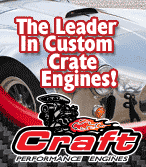

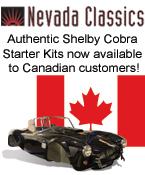

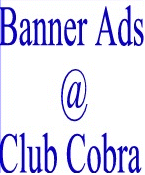
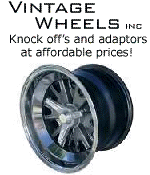


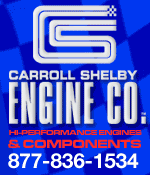











 Rick Lake
Rick Lake
 Linear Mode
Linear Mode



